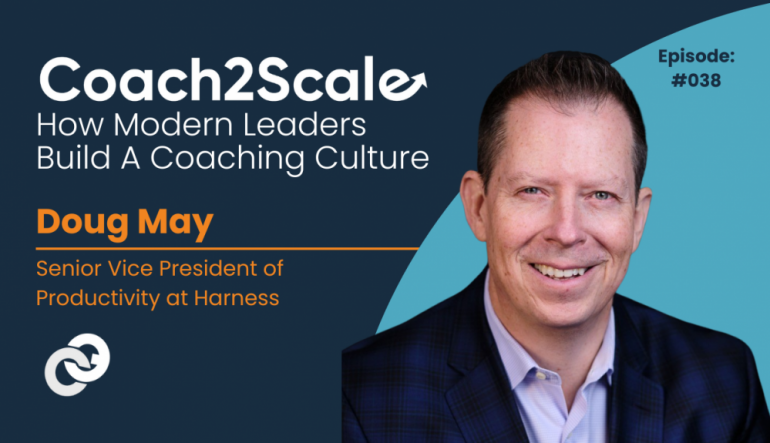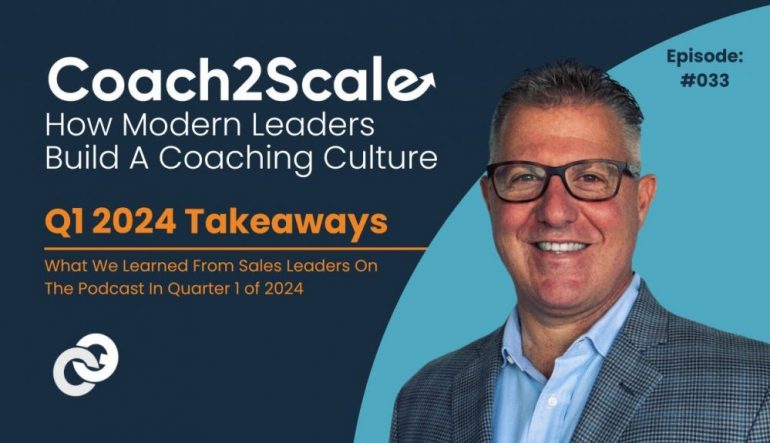After more than 100 episodes, #Coach2Scale wraps with a powerful closing message from host Matt Benelli, one that goes far beyond sales tactics. In this final episode, Matt shares four hard-earned truths from hundreds of conversations with CROs, enablement leaders, and frontline managers. He challenges the myth of the “super rep turned manager,” breaks down the true ROI of coaching (7–8X when done right), and reminds us that one-on-ones aren’t just a task, they’re the operating system for growth.
Matt also reflects on why performance loops aren’t enough without practice loops, and how great teams aren’t built on pressure, but on preparation. This episode connects the dots between personal development and business outcomes; it’s a call for CROs and GTM leaders to stop managing through dashboards and start developing their people with purpose. If you’re serious about building a high-performing team that lasts, this episode is your blueprint.
Lessons from 100+ Episodes of #Coach2Scale with Matt Benelli
When Matt Benelli launched Coach2Scale, it wasn’t to chase downloads or compete with the crowded sales podcast landscape. It was built on a mission: to shift the coaching conversation from buzzwords and dashboards to something real, something that could transform how go-to-market teams perform, grow, and believe in each other. Over 100 episodes later, that mission is more relevant than ever, and CoachEm is passionate about continuing the effort through our platform.
In the final episode of the series, Matt delivers a clear message for CROs and frontline leaders: authentic coaching isn’t about pressure. It’s about preparation, behavior change, and human connection.
The Top 4 Lessons from Over 100 Interviews with Sales Leaders
1. Vulnerability Is the Foundation of Growth
The first principle is simple, but often overlooked: the human side of coaching is not optional. It’s required. When things get hard, leaders don’t rise, they reveal. And the best ones don’t fake certainty; they model honesty and presence. They show their teams that it’s okay to say, “I don’t have all the answers, but I’m here with you.”
Great leaders balance empathy with accountability. They recognize that behind every quota is a person who wants to do meaningful work. Reps don’t just need strategy; they need belief. As Matt put it, “Quarterly quotas are short-term. Careers are long-term. Great coaches know the difference.”
2. The Manager Multiplier Is Real, and Undervalued
A properly equipped manager can deliver 7–8X ROI, just through coaching. That’s not a theoretical number. It’s backed by evidence from dozens of conversations and real-world outcomes. Yet most first-line managers are thrown into their roles with no training, no playbook, and no time.
They’re told to hit a number, run forecast calls, and somehow “coach” in between. The result? Burnout, disengagement, and stalled development. But when managers are given structure, support, and permission to prioritize coaching, everything changes. Engagement climbs. Turnover drops. Pipeline grows. Coaching isn’t something you squeeze in; it becomes how you lead.
3. Stop Promoting Super Reps into Management Without Support
One of the most repeated themes in the podcast was this: stop confusing selling with coaching. Being a top rep doesn’t make someone a great manager. The jobs are wildly different. Reps close deals. Managers develop people.
New leaders don’t need another dashboard or more pressure from above. They need process. They need a system. And they need someone to remind them: process beats heroics every time. Hero sellers don’t scale. Coaching does.
4. The Practice Loop Beats the Performance Loop
The best teams don’t just perform, they practice. And top performers don’t just “do the job.” They reflect, adapt, and improve. That practice loop is what separates good teams from great ones. Feedback in that loop must be immediate, specific, and behavioral, not emotional or vague.
As Matt explained, sales isn’t about delivering a pitch. It’s about diagnosing what went wrong, reflecting on why, and repeating until it sticks. Great coaches don’t wait until performance breaks down. They build structured opportunities to practice before performance is expected.
What CoachEm Made Possible
The Coach2Scale podcast didn’t just spark a conversation; it sparked a platform. CoachEm was built from the recurring pain points Matt kept hearing: managers drowning in task overload, reps unsure what to work on, and one-on-ones that felt reactive or random. The issue wasn’t a lack of tools. It was a lack of connection between behavior change and performance improvement.
At SchoolStatus, the impact of structured coaching became clear. A manager who used CoachEm for 79% of their one-on-ones saw a 72% increase in pipeline growth. A peer with only 23% usage saw just 25% growth. The difference? Coaching cadence, not luck. CoachEm didn’t just track coaching; it operationalized it.
The Mission Isn’t Over
As Matt signs off from the podcast, he leaves behind a roadmap for anyone building, scaling, or rebooting a sales organization. The episodes aren’t time-sensitive; they’re timeless. They’re filled with insights on one-on-ones, coaching under pressure, manager transformation, and how to avoid the “super rep trap.”
But the message lingers: real coaching doesn’t stop when the mic turns off. It lives in every one-on-one, every pipeline review, every conversation where you choose to develop your people rather than just direct them.
So if you’re a CRO looking to scale sustainably without burning out your team, the question isn’t whether to coach. It’s whether you’ll do it with intention, structure, and commitment.
Because as Matt says, “Coach ‘em if you want to keep ‘em.”





